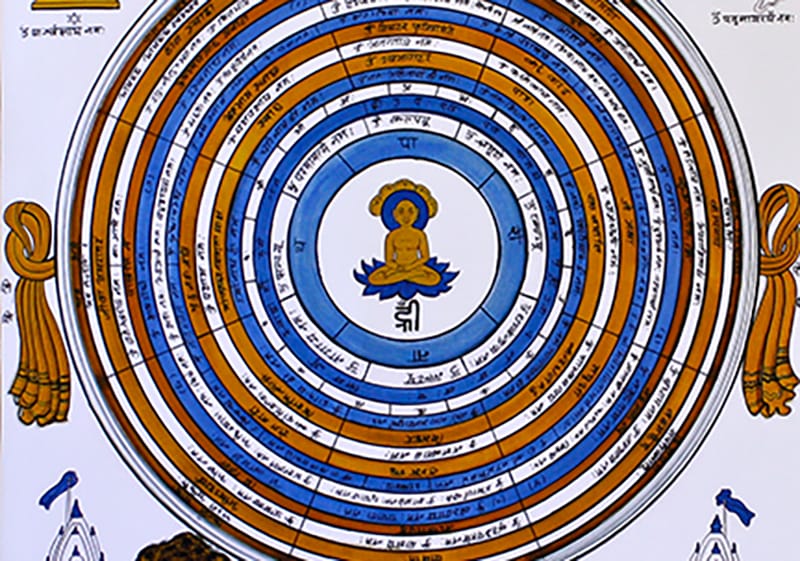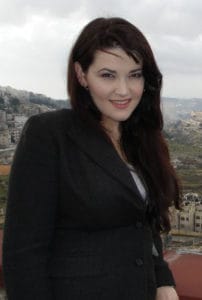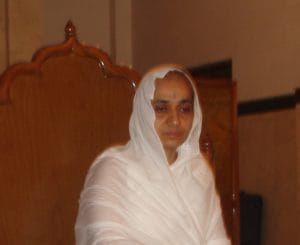Student Showcase: Whitny Braun

The Flame sat down with theology, ethics, and culture PhD student Whitny Braun to find out about the ground-breaking research she is doing into the arcane—and taboo by some standards—Jain ritual of sallekhana: the practice of starving oneself to death to purge the body of karma.
How did you end up studying religion, in particular, sallekhana, at CGU?
I had first been a public health professional and then a working bioethicist and found again and again that the root of people’s major life decisions lay in their religious beliefs. I thought that in order for me to get to the core of why people make the life or death decisions they do I needed to have a full understanding of the study of religion.

What is your current research focusing on?
At present my research focuses on the Jain ritual of sallekhana, which is the practice of purging the karma from one’s body and soul through the process of slow starvation ultimately resulting in death. I first encountered the practice on a trip to India in 2006 at a time in my life when I was dealing with a lot of end-of-life cases in the hospital as a bioethicist. At that point in time I was accustomed to seeing the end of a person’s life play out as a protracted tug-of-war between family, medical staff, lawyers, social workers, and clergy all trying to do what was best for the patient, with the ultimate result, more often than not, of the patient dying attached to a lot of machines for an extended period of time and their wishes being lost somewhere in the shuffle. My introduction to sallekhana was in the form of an 80-year-old man of sound mind and body who simply decided that he wanted to start ending his life by reducing the amount of food he consumed little by little each day until he ultimately passed away. As an outside of observer this was anathema to the Western bioethics I had been trained under and felt compelled to learn more. At present I am working to incorporate what I believe to be the only legally documented case of sallekhana in American history. I am not an advocate of sallekhana. However, I think that all religious belief systems deserve to be regarded as being of equal importance in the life of the believer.
This sounds very intense. Why this, why now?
Death is a ubiquitous and universal spiritual experience with legal, financial, emotional, and religious ramifications. To me, there is nothing else in the world more personal than one’s own mortality and I think it is incredibly important to understand and honor each individual’s spiritual beliefs regarding how they come to the end of their time on this Earth. At present the high court in India is debating whether or not to ban sallekhana as being akin to suicide. In the United States there is no legal precedence for sallekhana, but suicide is a crime. However the 9th Circuit Court of Appeals has ruled that a person of sound mind and body cannot be forcibly fed against their will. So if a Jain practicing their faith here in America wants to engage in sallekhana because it is their religious duty to do so, how is that recognized under the law? Would a person’s First Amendment right to freedom of religion trump the criminalization of suicide? All of these questions are stated in the abstract here but for a person facing the end of their life these are difficult, emotionally layered decisions that are made all the more difficult by societal expectations of how and when a person should experience the end of their life.
You’ve received a fair amount of recognition for your work. Tell us about that.
I was awarded the CGU Friedman grant for the past two years to carry out this research and was invited to speak on this topic at several international conferences, at Cal State Long Beach as part of their South Coast Interfaith Council’s “Religions 101” series, and I have been interviewed by Steve Lopez of the Los Angeles Times and asked to produce a segment on sallekhana for the National Geographic channel’s show Taboo.

Wow, NatGeo, that’s pretty big.
I had published a couple of papers on sallekhana around the time I started at CGU and then let my research sit dormant for a while so that I could focus on my doctoral courses. Then in 2011 I received a call from a researcher at the television show Taboo . . . He had read my article and wanted to feature the practice on an upcoming episode. And so the journey began of putting the show together, getting the footage, and writing the content so that sallekhana was handled fairly and not as some macabre spectacle. The show aired in October 2012. Shortly following the airing of the show, which featured a Jain nun in India taking sallekhana, I was contacting by a woman named Bhagwati Gada in Texas who was planning to take sallekhana herself and was willing to allow me to interview her and chronicle her journey. Now I am working to put the stories I have collected of sallekhana together with the legal research and the scientific research to craft my dissertation and honor Bhagwati’s memory in the process.